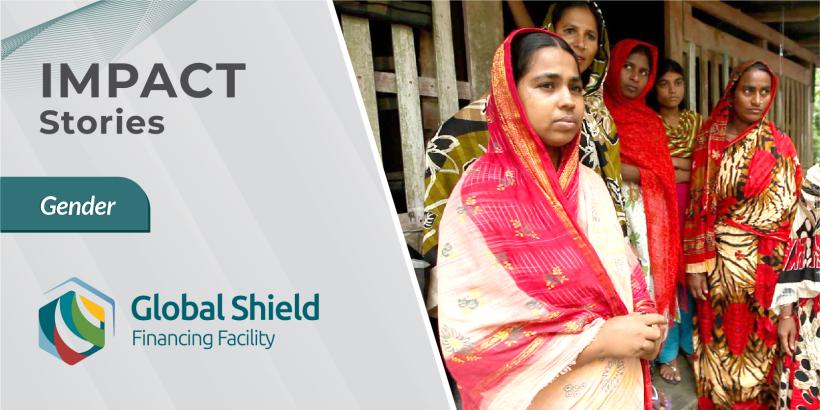The Global Shield Financing Facility's Stories of Impact | Advancing Gender Equality for a Resilient Future

Gender gaps in several areas contribute to women being more severely affected by natural disasters than men.
An estimated 80 percent of those displaced by climate change are women, and women are disproportionally represented among the 4 billion people globally who are excluded from social protection schemes. For example, only 26.3 percent of working-age women are covered by a pension scheme, compared to 38.7 percent of working-age men. Additionally, women make up 55 percent of the world’s unbanked adults, meaning they have no access to financial services like bank accounts or insurance. As a result, they struggle to access information and funds, especially in emergencies. With the increasing incidence of natural disasters, the need to level the playing field for women—often the main caretakers of their families—has never been more pressing.
National government policy and regulatory frameworks relevant to disaster risk financing and insurance (DRFI) are commonly gender blind. Addressing gender dimensions in policy formulation and project work is not only important from a human rights perspective but also is good development policy and makes sound economic sense.
Closing the gender gap in the workforce could add US$28 trillion (26 percent) to the global GDP by 2025.
However, most DRFI frameworks overlook gender inequalities in access to financial instruments and services, public financial management, government registration processes, and delivery channels for payouts.
Several areas of focus in the World Bank’s existing and proposed Gender Strategy are highly relevant to DRFI interventions—specifically, human capital, gender-based violence, and economic participation. These are all areas where setbacks are likely during and after a disaster. Women’s leadership and engagement in climate action and disaster preparedness improve resource management and resilience. The proposed Gender Strategy points out that women are producers and adopters of climate change solutions on farms, in businesses, and at home, and they engage in preserving natural assets. Their leadership, innovations, and decision-making in climate and environmental action are associated with improved sustainability, resource management, and climate resilience. The Global Shield Financing Facility (GSFF) places a high priority on addressing gender gaps in DRFI and employs gender-sensitive methodologies to enhance outcomes for women in disaster preparedness and recovery, thereby contributing to the Gender Strategy’s overarching objectives.
Three Main Priorities of GSFF’s Own Gender Strategy
1. Incorporating gender into GSFF systems and processes: Gender considerations are systematically integrated into GSFF’s project design, approval, implementation, and result monitoring processes, ensuring that gender is considered throughout the project cycle to achieve results for women on the ground.
2. Elevating gender knowledge and capacities: A primary goal of the GSFF is to bolster the understanding of gender inequalities and their implications among World Bank DRFI task teams. By being connected to gender-focused resources, experts, and knowledge, these teams will be better equipped to design and implement project activities that contribute to closing gender gaps in DRFI.
3. Forging collaborative partnerships: GSFF aspires to establish robust partnerships with humanitarian organizations and civil society entities. Partnering with such groups contributes expertise as well operational capacity and tends to increase reach and impact, in particular when it comes to reaching women.
Engaging women in the strategic planning of disaster and climate risk management has multiple benefits
Engaging women in the strategic planning of disaster and climate risk management has multiple benefits: it ensures that diverse viewpoints are included; increases the likelihood that DRFI initiatives have sustainable, inclusive impact; and contributes to more comprehensive, economy-wide preparedness and recovery. Indonesia is resolutely pursuing a 30 percent representation of women in leadership positions for DRFI projects. In Burkina Faso, women’s collectives spearhead workshops and discussions focused on enhancing the gender perspective in DRFI projects. In Lesotho, women’s presence in work groups far surpasses that of men. The Government of Malawi’s DRF task force is led by a woman, while in Sierra Leone, women provide invaluable contributions within the ranks of the Ministry of Finance.
------------------------------------------------------------------------------------------------------------------------------------------
The Global Shield against Climate Risks is an initiative launched by the G7 and Vulnerable Twenty (V20) Group of Ministers of Finance; it aims to increase protection for vulnerable people and countries by facilitating substantially more and better pre-arranged finance against disasters and climate risks. The Global Shield against Climate Risks is implemented through its financing vehicle, which includes three programs: The Global Shield Solutions Platform, hosted by the Frankfurt School: the CVF & V20 Joint Multi-donor Trust Fund and the Global Shield Financing Facility hosted by the World Bank.